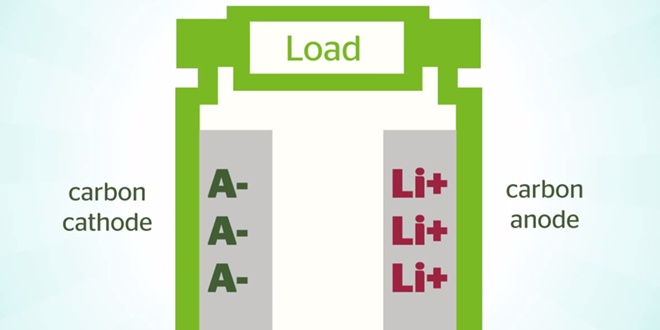Seldom does a week go by without an announcement of a promising new battery technology – but the road from the laboratory to the auto dealership is a long one, and there’s no knowing which of today’s breakthroughs might enable tomorrow’s mass-market EVs.
This week’s news, from Power Japan Plus, almost sounds too good to be true. The company says its Ryden dual-carbon battery offers energy density comparable to lithium-ion, but is superior in just about every other way – longer-lasting, safer and more sustainable.
In the Ryden battery, both anode and cathode are made of carbon. The company’s unique chemistry involves proprietary changes to the nanostructure of the carbon crystals. Dual-carbon cells were described in theory as early as 1978, but years of development were required to make them reliable, cost-effective, and suitable for volume production, Power Japan Plus CEO Dou Kani told Green Car Reports.
According to the company, the Ryden battery can be charged 20 times faster than lithium-ion batteries, and can deliver more than 4 Volts of power from a single cell. It has been tested over more than 3,000 charge/discharge cycles with virtually no performance loss.
Power Japan Plus calls its battery chemistry the safest ever developed. “The Ryden battery eliminates the unstable active material used in other high performance batteries, greatly reducing fire and explosion hazard. The battery experiences minimal thermal change during operation, eliminating the threat of a thermal runaway. It can be 100 percent charged and discharged with no damage to the battery.”
Now how much would you pay? But wait, there’s more! The Ryden battery contains no rare earth elements or heavy metals, and is 100 percent recyclable. Perhaps most enticing to an automaker, the company claims that its cells can be produced by current manufacturing processes, requiring no change to existing manufacturing lines.
Power Japan Plus plans to announce a partnership in August with a “world-renowned company” in the auto racing field, which will build packs and complete battery systems, and to begin benchmark production of 18650 Ryden cells later this year at its facility in Okinawa. The first products will be produced for specialty energy storage markets such as medical devices and satellites. For EV battery cells, the company will operate under a licensing model, providing its technology to existing manufacturers to produce the Ryden battery.
Power Japan Plus will exhibit at next week’s EDTA Conference in Indianapolis.
“Power Japan Plus is a materials engineer for a new class of carbon material that balances economics, performance and sustainability in a world of constrained resources,” said Kani. “The Ryden dual carbon battery is the energy storage breakthrough needed to bring green technology like electric vehicles to mass market.”
Source: Power Japan Plus, Green Car Reports



















































